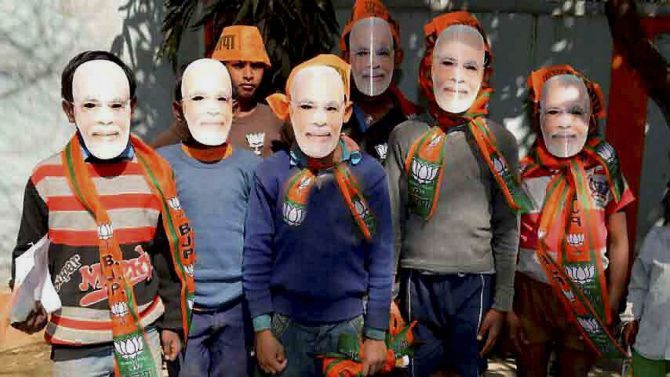'If the BJP wins UP and one or two other states, it could get emboldened and press ahead with its reckless agenda, as well as its divisive agenda.'
'If the BJP fails to form the government in UP and suffers a setback in Punjab and maybe one other state, it could go either way: It could become more reckless or pull back, pause and take stock, moderate its position.'

'After the UP polls, I don't know what the BJP will do,' P Chidambaram tells Aditi Phadnis.
In 2014, India seemed to have everything going for it. How did we reach here?
I wouldn't say there were no challenges. In 2012-2013 and 2013-2014, the effort was to bring back financial and monetary stability, affected by the international financial crisis.
We had succeeded in substantial measure, but not fully.
What the government should have done in 2014 was to continue measures for greater financial and monetary stability; at the same time, restart the engines of growth.
What they failed to do is address why private investment was drying and exports were declining year after year.
They thought, wrongly, that government expenditure and private consumption, the other two engines of growth, were sufficient to drive the vehicle.
Two engines that stalled, two engines were driving, and they thought they could cruise along.
That was a mistake.
In an article you wrote in 2016, you said the triggers for boosting the economy were absent. Have they come back?
In fact, one more engine has stalled.
The engine of private consumption has also stalled, thanks to demonetisation.
The figures are out and they tell us private consumption has been severely dented by it.
The distress people have had to go through is not showing in elections, not showing in public outbursts.
People are not ready to lay the blame on any person or party.
How do we explain this?
Most people do not comprehend what demonetisation is.
When the prime minister says: 'I have done this to stamp out black money, corruption and funding of terrorism,' people tend to believe him and say, 'these are good objectives, let us see if demonetisation will achieve these.'
They will come face to face with reality.
When they are faced with the next demand for a bribe, when they see that someone, post-demonetisation, has accumulated a large amount of unaccounted wealth, when they are faced with the next terrorist attack and agencies find new currency in the hideout of terrorists -- then, people will realise that demonetisation is not the instrument to deal with black money or corruption or terrorist funding.
The first reality check will be in May-June, when colleges demand capitation fee and parents who have to cough it up in cash will realise demonetisation has not put an end to black money and they are obliged to generate it to meet the demand.
Similarly, when a farmer goes to the tehsildar's office for an income certificate or caste certificate or mutation of his record, or goes to the registrar of properties to register a sale deed, and is asked for a bribe, he will realise that demonetisation has not put an end to this.
What dangers do you see on the horizon?
The biggest unknown is the outcome of the five state elections.
I think it is a crucial election for the Bharatiya Janata Party and will certainly mark a turning point.
If the BJP wins UP and one or two other states, it could get emboldened and press ahead with its reckless agenda, as well as its divisive agenda.
If the BJP fails to form the government in UP and suffers a setback in Punjab and maybe one other state, it could go either way: It could become more reckless or pull back, pause and take stock, moderate its position.
I did say the same thing after the Bihar election.
But, much to my dismay, the BJP did not pull back, pause, take stock and modulate its position.
After the UP polls, what the BJP will do, I don't know.
So, what you are expecting from the BJP, to paraphrase a former trade minister, is to turn itself into another Congress-plus-cow?
I certainly don't say that. The BJP must become a more mainstream party.
It is seen as a party that excludes a large section of the people.
In my judgment, Dalits feel excluded.
Minorities feel excluded.
The business community is increasingly feeling excluded.
Youth feels completely excluded.
And, women.
It must become a more mainstream party for the period it is in government.
I fervently hope the BJP will become more inclusive.
The external business environment is becoming increasingly more unpredictable, even hostile. And squabbles are breaking out in some of the most important companies.
Concerns about lower profit margins are being masqueraded as issues of corporate governance.
How should corporate houses respond to a more competitive external environment?
In any business, there are two elements, ownership and management.
In very large corporations, the ownership might seem invisible, but even in such cases, owners can band and bring about a change of management, here or abroad.
In the Indian corporate world, ownership was dominant. The owner was everything.
As companies are getting larger and larger, ownership is getting diluted.
In that transitional phase, there will be conflict between management and ownership.
When the owner is the dominant one -- 51 per cent plus -- his voice will ultimately prevail.
Where the owner is a minority, 20, 25, 14 per cent, there will be conflict.
Both management and ownership must learn how to exercise their relative powers and influence in this changing environment.
Those lessons are, I think, being learnt.
It will take some time for them to be learnt and fully absorbed.
In the transition, there will be conflict.
It is really a question of control. Owners are loath to give up control.
Management is keen to dilute the control of owners.
It's when owner equity falls between 5 and 51 per cent, and when the dilution is taking place, more and more equity is being pumped in, that this conflict is inevitable.
Every country's corporate world has gone through this.
What advice would you give to this finance minister?
I fundamentally disagree with many objectives of this government.
But, even taking these as a given, they are not doing enough to achieve those.
They claim growth is an objective, but are not identifying the triggers.
They claim they want a tax-friendly administration. But everything they have done in the past two-and-a-half years has only empowered and emboldened the tax men, at the cost of the citizen.
They claim they are pro-poor, but have repeatedly cut expenditure on social sector programmes.
They claim they are the best guarantors of the defence of the country. In the budget of 2017-2018 they have cut even defence capital expenditure.
What sort of a 2018-2019 Budget should we expect, when we will be heading towards a general election?
As I said, the outcome of the state elections is a crucial turning point.
A Budget can target growth.
It can target financial and monetary stability.
It can target expanded social welfare programmes.
Which way the horse will turn, I can't say.
I think it will depend to a large extent on the state elections and the Cabinet reshuffle that I'm told will take place after the election results are out.
IMAGE: Boys wear Modi masks during the UP election campaign in Allahabad. Photograph: PTI Photo
MUST READ features in the RELATED LINKS below...












 © 2025
© 2025